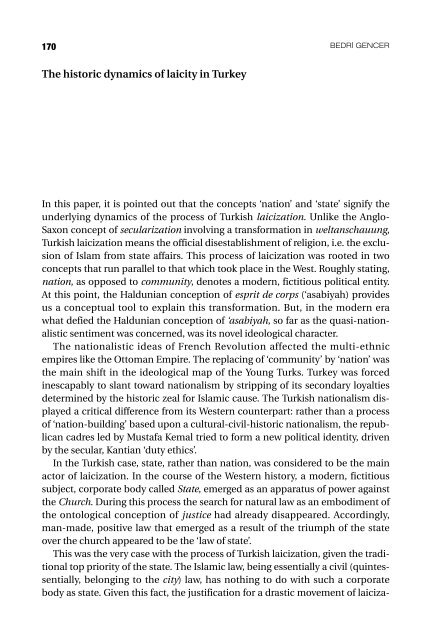You also want an ePaper? Increase the reach of your titles
YUMPU automatically turns print PDFs into web optimized ePapers that Google loves.
170<br />
BEDRİ GENCER<br />
The historic dynamics of laicity in Turkey<br />
In this paper, it is pointed out that the concepts ‘nation’ and ‘state’ signify the<br />
underlying dynamics of the process of Turkish laicization. Unlike the Anglo-<br />
Saxon concept of secularization involving a transformation in weltanschauung,<br />
Turkish laicization means the official disestablishment of religion, i.e. the exclusion<br />
of Islam from state affairs. This process of laicization was rooted in two<br />
concepts that run parallel to that which took place in the West. Roughly stating,<br />
nation, as opposed to community, denotes a modern, fictitious political entity.<br />
At this point, the Haldunian conception of esprit de corps (‘asabiyah) provides<br />
us a conceptual tool to explain this transformation. But, in the modern era<br />
what defied the Haldunian conception of ‘asabiyah, so far as the quasi-nationalistic<br />
sentiment was concerned, was its novel ideological character.<br />
The nationalistic ideas of French Revolution affected the multi-ethnic<br />
empires like the Ottoman Empire. The replacing of ‘community’ by ‘nation’ was<br />
the main shift in the ideological map of the Young Turks. Turkey was forced<br />
inescapably to slant toward nationalism by stripping of its secondary loyalties<br />
determined by the historic zeal for Islamic cause. The Turkish nationalism displayed<br />
a critical difference from its Western counterpart: rather than a process<br />
of ‘nation-building’ based upon a cultural-civil-historic nationalism, the republican<br />
cadres led by Mustafa Kemal tried to form a new political identity, driven<br />
by the secular, Kantian ‘duty ethics’.<br />
In the Turkish case, state, rather than nation, was considered to be the main<br />
actor of laicization. In the course of the Western history, a modern, fictitious<br />
subject, corporate body called State, emerged as an apparatus of power against<br />
the Church. During this process the search for natural law as an embodiment of<br />
the ontological conception of justice had already disappeared. Accordingly,<br />
man-made, positive law that emerged as a result of the triumph of the state<br />
over the church appeared to be the ‘law of state’.<br />
This was the very case with the process of Turkish laicization, given the traditional<br />
top priority of the state. The Islamic law, being essentially a civil (quintessentially,<br />
belonging to the city) law, has nothing to do with such a corporate<br />
body as state. Given this fact, the justification for a drastic movement of laiciza-


